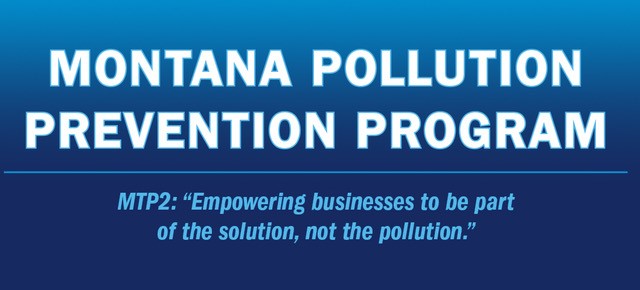Information for businesses interested in a MTP2 Pollution Prevention Intern
MTP2's POLLUTION PREVENTION SUMMER INTERNSHIP

MTP2 - Montana Pollution Prevention Program
“Empowering businesses to be part of the solution, not the pollution.”
· MTP2 Interns Can Tackle Your Waste and Energy Projects
Your business may be able to address waste reduction and energy efficiency projects sooner and faster with the help of a MTP2 intern. An intern can make suggestions that improve efficiency, save money, reduce waste, or decrease regulatory compliance burden. Also, an intern has the time and creativity to research alternative equipment, procedures, chemicals, and raw materials Check out these past internship projects including Pasta Montana that helped PM conserve 13.1 million gallons of water and $81,800 annually. All proprietary information at your facility can be kept confidential during and after the intern project.
Additionally, your business will benefit from:
- A new set of eyes looking at your waste or energy project
- Your intern being mentored and guided by a Montana Manufacturing Extension Center
(MMEC) advisor - A full report and presentation detailing the intern’s work and next steps for your
company - MTP2 managing the recruiting, hiring, and training process
· Your Business does not pay for the MTP2 Intern*
The full cost of a MTP2 intern project includes costs related to the student, an on-site supervisor provided by the company, a MTP2 advisor, a MMEC advisor, and a MSU professor. Students are paid $19/hour (undergrad) or $21/hour (graduate) during the 275 hours of summer employment (one week of training plus 30 hrs/wk for 8 weeks) for a total salary up to $5,775. The interns are responsible for their housing costs for the summer; however, we are always looking for reduced rent opportunities to assist our interns. Please let us know if you are aware of any opportunities.
· Is Your Business Eligible for an MTP2 Intern?
Each summer, the MTP2 intern program hires and places highly qualified students in a wide variety of food and beverage, manufacturing, and processing facilities to develop industry-tailored solutions for waste and energy challenges.
To qualify for the intern program, your business must be:
- Located in Montana
- Committed to reducing or eliminating industrial waste (air emissions, water, energy,
solid or hazardous waste) and/or improving energy efficiency by:
- Developing a project idea with the intern and the MTP2 program advisors that applies to other Montana businesses.
- Performing trials to make operation or procedural improvement, such as substituting equipment or raw materials.
· Company Roles and Responsibilities: Business Agreement
Each project requires an MTP2 Intern Project Agreement. The agreement outlines the project, sets the scope of work, and defines the research and deliverables. It highlights the roles and responsibilities of the people involved. This agreement is developed once your business has committed to an intern and then it is signed by representatives at your facility, MTP2 staff members, and Montana.
While the agreement provides greater details about each company’s roles and responsibilities for the intern project the following are general responsibilities.
- Assign an internal project supervisor who will provide ongoing daily supervision of the intern.
- Develop a work plan/timeline for the project with the MTP2 technical advisor.
- Identify sensitive, proprietary, or confidential information.
- Inform management and other employees about the intern and of the project goals.
- Provide appropriate safety training and supervision to the intern.
- Provide the intern with tools to work, including a desk or worktable and access to a telephone, fax machine, and computer.
- Track and report your businesses "in-kind" hours supervising the intern at the end of the internship.
- Pay all costs associated with and stemming from approved student work, including any approved tests, equipment or supplies needed to develop project objectives. Exceptions include student’s salary and limited travel expenses.
- Facilitate employee cooperation with the intern to ensure that the intern receives the assistance or information needed for the project.
- Periodically consult with MTP2 and MMEC advisors regarding project status and satisfaction with the intern’s work.
- Review and evaluate the student’s findings, conclusions and proposals for accuracy, feasibility, and relation to company needs and objectives.
- At your company’s sole discretion, implement cost-effective waste reduction measures identified by the student, where feasible.
- Review the final draft of the project report for completeness and clarity as a proposed implementation plan for the company.
- Evaluate the intern’s performance and the intern program in general at the conclusion of the project.
- Provide MTP2 with feedback describing the benefits of this project.
- Participate in final presentation in Bozeman (or virtually) if possible.
Testimonials From Past Businesses
BUSINESSES CAN APPLY TODAY!
If you are interested in applying for the MTP2 internship, please contact:
JENNY GROSSENBACHER,
DIRECTOR, MTP2
[email protected]
406-994-4292
“Empowering businesses to be part of the solution, not the pollution”
